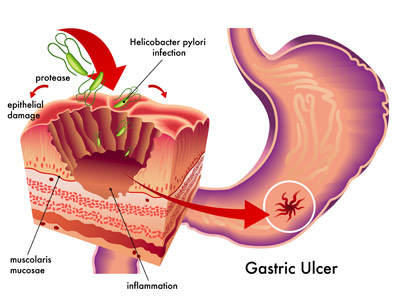
Dehydration: Is It A Cause of Peptic Ulcers?
Use "water therapy" to prevent peptic ulcers: Drinking 2 liters of water daily and a large glass of water before meals can reduce peptic ulcers
An estimated one in ten Americans develop a peptic ulcer at some time in his or her life according to the National Institutes of Health (NIH). A peptic ulcer is a sore on the lining of the esophagus, stomach, or duodenum. Peptic ulcers have different names depending on their location in the gastric system: gastric ulcer (for a peptic ulcer that develops in the stomach), duodenal ulcer (the ulcer that occurs in the upper part of the small intestine), and an esophageal ulcer (an ulcer that is located in the lower portion of the esophagus, which is usually associated with gastroesophageal reflux disease).

Disagreement on the Causes of Peptic Ulcers: Bacteria Helicobacter Pylori vs. Dehydration and Stress
There are different schools of thought on the causes of peptic ulcers. Mainstream medical practitioners hold a belief that contrary to popular belief: peptic ulcers are not caused by stress, eating spicy food, or drinking excess alcohol, although these factors can certainly aggravate an existing ulcer. Rather, some peptic ulcers have been attributed to the long-term use of certain medications (i.e., nonsteroidal anti-inflammatory drugs such as aspirin and ibuprofen) and cancerous tumors in the stomach or pancreas. Many researchers and doctors believe that most peptic ulcers are caused by bacterial infection of Helicobacter pylori (H. pylori), which attacks and weakens the protective mucous coating of the stomach, esophagus, and duodenum, allowing the gastric acid (containing hydrochloric acid, HCl, at approximate pH of 1 to 2) to penetrate the sensitive lining underneath. Both the stomach acid and H. pylori irritate the lining and cause the ulcer. Scientists have found that H. pylori can survive in the harsh acidic environment of the stomach because it secretes enzymes that neutralize the acid, thus permitting this spiral-shaped bacterium to lodge in the "safe" area-the protective mucous lining-and then burrow through the lining.
The other school of thought believes that the triggers or causes of peptic ulcers is dehydration and stress. Researchers who subscribe to this belief point out that approximately 40 percent of the population carries the bacterium H. pylori in the United Kingdom (UK), yet only one out of five people who are infected with this bacterium actually develop peptic ulcers. So H. pylori alone are not the cause of peptic ulcers. Medical practitioners who hold this theory believe that when people don't drink enough water, the lining of their stomach and duodenum are unable to generate the thick layer of mucus required to protect them from the highly acidic gastric juices. The mucus layer is thus more susceptible to attacks by the bacterium H. pylori.





